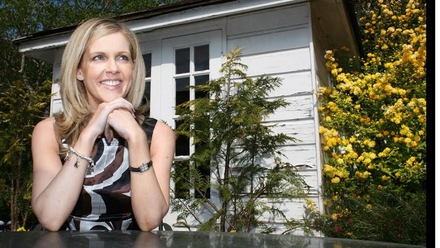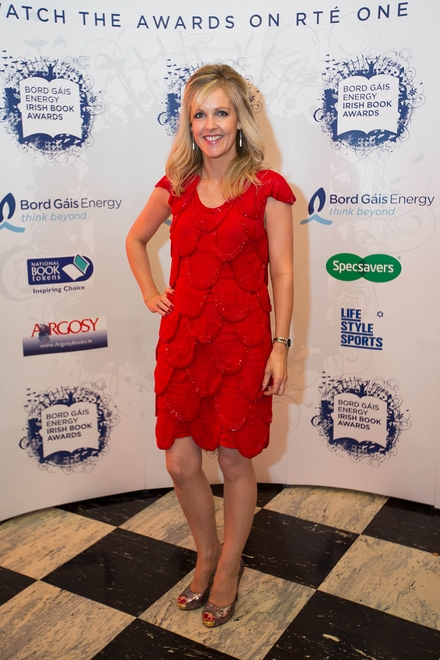"If you don’t structure your day, the books are not going to get written, "author Sinéad Moriarty tells TEN's Paddy Kehoe. "I have my phone on silent, which drives everybody mad . . . . because I need to make that time work for me."
September is almost half way through and Sinéad Moriarty is back to work. “I am a firm believer that the harder you work, the more creative you are, no doubt about it,” she says. Her 11th novel, The Way We Were, was recently published to much acclaim, and like her previous books was a holiday best-seller.
“The summer, while it’s great, you know, at the same time when you have children, three months is a lot," says the Dublin novelist. “So by the time September comes I’m definitely ready for routine – I’m somebody who thrives on routine, I’m not very good when I don’t have set hours. I’m head down now really.”
Her children, aged between ten and six, are back in primary school. “So It’s great, I get six quiet hours to myself, which basically also means I’ve no excuse. But I love what I do so I’m more than happy to get back to it.” Does she have writing rituals? “I have a little office space at home. I face the wall, I think it’s important because if I was looking out the window I would be very distracted. I have an old writing cardigan that I wear. I always have the whole plot of my book before I start, I have that in front of me, so I know what’s going on, I’ve done my research so I just need to get cracking.“
Sinéad has employed the same modus operandi for each of her eleven novels published in as many years since she first came to public notice with The Baby Trail. The sequence is “research, chapter breakdown and then start writing.” Already she has much of her next book plotted. “My biggest fear I think every writer’s biggest fear is to be stuck for an idea, but I am a firm believer that the harder you work, the more creative you are, no doubt about it.”
Three couples will feature in the as yet untitled story, she says, told in the third person, with different chapters devoted to different couples. “There will be a young person’s voice as well. The main theme is guilt. One of the main characters is going to suffer quite badly from burns.”
Research involves “an awful lot of reading and once I’ve a handle on my topic I will go and meet experts in the field.” Research helps her arrive at the appropriate questions and not waste people’s time. “So I try and get up to speed on my subject matter before I actually meet experts. In the case of her next book, she bought many books, covering the medical aspects of burn incidents to first person accounts. “I’m hoping to talk to plastic surgeons and nurses who are involved in burns units.” Expect that book to appear in 2016. “I hope so, I have to write it though!” In terms of treating herself, the novelist bought a Mary Carroll painting of the old Shelbourne bar after the success of the first book, The Baby Trail. “I still have that, I think it was a nice way to mark it.”
Ireland and the UK are strong markets for her and her novels have been translated into 25 languages. “I love seeing the foreign covers, it just gives you such a thrill. ”The Baby Trail went to number 11 in the UK and she would of course like to be anywhere in the top 10. “It really is about people reading your books. I certainly wouldn’t be sitting there counting numbers, but - and it includes translations rights - it gives me great joy to think that somebody in Russia is reading my books.”

So she is read in Norwegian, Croatian, Hungarian, Greek, Polish, Russian and Italian amongst many other languages. She welcomes feedback and there is an email address on her website. Facebook and Twitter help the process. Responses tend to be positive, though occasionally a reader might disagree which something that was said or she might be challenged about about a character’s behaviour. “I’m fine with that, I think it’s kind of interesting actually.”
Her books’ universal appeal is down to “very strong themes, as in serious themes – from infertility to adoption, to cancer and Aspergers, “ she believes. “Family is very strong in my books, and everybody has a family – families are complicated and so I think people can relate to that.” In her novel, The Secrets Sisters Keep, the daughter has Aspergers and the author got many emails on publication of the novel. “That was amazingly interesting to research, I met phenomenal people and I learned a lot myself.” She met mothers and fathers of children with Aspergers, the children themselves, and psychologists. “It’s all about early intervention, everyone I spoke to, that’s the key.”
The writing business is solitary, of necessity, and the Trinity graduate (French and Spanish) usually works nine to three, weekdays only. The target is 1,500 words per day. “I’m lucky because when I’m not working my life is very noisy and busy. So when I’m not working it’s very full on. I quite like the balance of the two, I really value my quiet time.”

The author pictured at the Irish Book Awards in 2012.
Her father Aidan passed on a few months ago, aged 76. “He was a great supporter, " she says, although aware that he was ‘a mad history buff.’ Her mother Mary has written a series of books for O’Brien Press on Irish historical figures, Swift, Yeats, Joyce et al, and she was a great inspiration in the early days of her career. “Her book on Yeats - a kind of condensed biography - is still selling all these years later.”
She treats the writing as a job. “It’s a great job, but it is a job, if you don’t structure your day, the books are not going to get written, that’s the bottom line. I have my phone on silent, which drives everybody mad - I never answer my phone, because I need to make that time work for me, I have to be productive during those hours.”
August isn’t normally so solitary, she tends to be promoting the new book. “I always say ‘have passport, will travel’ – I would love to go to more countries.” Sinéad mentions a promotional trip to Italy with particular fondness, but Europe is more difficult than heretofore in terms of selling her books. “Things kind of fell of a cliff, really, but thankfully the UK has been good to me.”
We get to talking about finding one’s own voice and tone. “You have to trust your own voice, because it’s unique,” she says, recalling that when she started out writing she tried to adopt another narrative persona. “I was trying to be something I was not. The Baby Trail was absolutely 100 per cent my voice, and that’s I think why it works, because I figured out that my own voice is perfectly good enough.”
The Way We Were is published by Penguin Ireland

